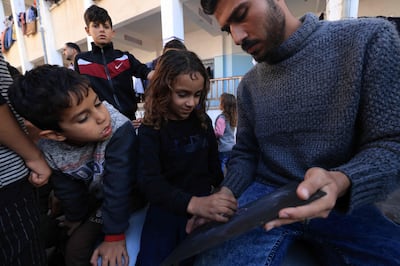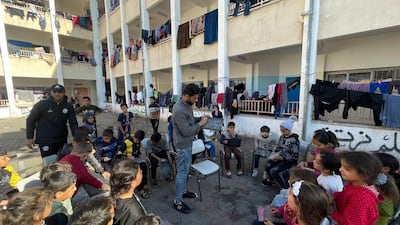Live updates: Follow the latest news on Israel-Gaza
As international leaders work against the clock to negotiate a permanent ceasefire, one man is trying to bring back a semblance of normality for the children in south Gaza.
Dozens of children gather in the open space of Rafah's Taha Hussain school, crouching closer to the Palestinian English teacher as he presents the day's lesson.
“Sadly this is not a conducive environment for children to effectively learn and grow their skill set and knowledge pool, but this will have to do for now,” said Tariq Al Annabi.
The 25-year-old teacher has taken it upon himself to try to maintain the schooling of these children, since the temporary pause was announced.
"A number of us staying in the school have volunteered to resume the schooling of the children here ... using personal blackboards and chalk so they can write and practise their English," Mr Al Annabi said.
“We want to focus their energies on something useful and to be a welcoming distraction from the tense surroundings.”
Mr Al Annabi is from Gaza city where he taught at a school in Hayy Al Zaytoun.
That school now lies in ruins.
Taha Hussain Elementary School is in the Al-Brazil neighbourhood of Rafah, in the southern Gaza Strip.
“Everyone from my area has moved to the south to this school here in Rafah's Khan Younis area.”
Mr Al Annabi says that most of the children living at the school have been cut off from their education for more than 50 days, since the war started.
“I'm enjoying this outdoor English class. I don't want to forget any of the lesson I have been taught, so practising my English here is quite good," said Layan, six, who arrived at the school 40 days ago.
“We worry that they will forget what they had learnt at the start of the school year, and we would like to avoid having to start from zero once the war is over, “ Mr Al Annabi said.
For now, the truce has been extended for another 24 hours.
The four-day truce from November 24 had already been extended by two days and was scheduled to expire early on Thursday, with Israel pledging a quick resumption of its air-and-ground campaign that Gaza authorities say has killed more than 15,000 people, most of them women and children.
Since the start of the war, thousands of displaced Palestinians have been sheltering in schools, where the numerous classrooms can shelter a large number of people.

But the schools have not been spared Israeli fire and hundreds have died across the enclave since October 7.
On November 18, the Israeli army hit the Al Fakhoura School in the Jabalia camp, resulting in at least 50 people being killed, Gaza's Hamas-run Health Ministry said. Thirty-two others, all members of a single family, died in a second strike on the camp.
“We provide the Israelis – twice a day – all the GPS [co-ordinates] of all our installations. Especially those which shelter internally displaced people, like Fakhoura," said UNRWA spokesman Adnan Abu Hasna.
“This school was sheltering thousands of displaced, we don't know why they attacked it.”
Videos posted on social media appeared to show bodies covered in blood and dust on the floor of a building.
Jabalia is the biggest refugee camp in Gaza, where about 1.6 million have been displaced by more than six weeks of fighting between Israel and Hamas.
Two UN schools were also targeted in the Bureij camp and one in Jabalia camp in the north of the Gaza Strip on November 2.
UNRWA said the schools attacked had between them held up to 20,000 displaced people and had suffered severe damage.


